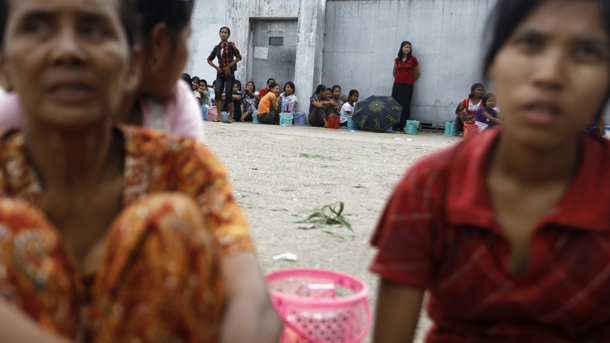Hunger strikers at Yangon Crown Steel Factory returned to work on Thursday after settling a dispute with their employer over better pay and conditions although three remain in hospital.
Twenty-five workers began the starvation protest on May 25 with another 20 joining during the weekend. The three suffering serious ill-effects are currently receiving treatment Rangoon’s Asia Taw Win Medical Clinic.
Around 400 workers originally staged a walkout on May 19 to demand better pay and conditions at the factory in Myaungtagar Industrial Zone, Hmawbi Township.
“They end the strike on May 29 because their employer agreed to all the 13 points they asked for regarding pay and conditions,” Mar Mar Oo, a leader of the 88 Generation Students group, told The Irrawaddy. “The first 12 points regarding conditions were settled quickly but the final one about pay took a little longer.”
Although the employer refused workers’ demands of rise in the basic daily wage from 160 kyat (less than US $0.20) to 1,600 kyat ($2) for lowest paid staff, the factory will now instead pay 1,000 kyat a day when it is forced to close for power cuts or other unforeseen circumstances.
Monthly incomes, including overtime and various allowances, range from 4,500 to 10,000 kyat ($5.35 to $12).
Meanwhile, EMG garment factory, in Taikkyi Township, northern Rangoon Division, also stopped striking after agreeing to their employer’s offer of an 8,000 kyat ($10) per month salary increase. The workers originally demanded 10,000 kyat ($12) extra while the factory boss only wanted to give 6,000 kyat ($8).
Eight factories in Rangoon’s Hlaing Tharyar Industrial Zone are still striking with Taw Win Myanmar embroidery joining on Tuesday. Activists apparently clashed with factory security there on Wednesday, while allegations have also arisen regarding child labor.
Others currently involved in industrial action include Sunny garment factory, Myanmar Sunny garment factory, S-Square shoe factory, Myanmar CM garment factory, Ngway Gango garment factory, Gaba garment factory and Hi-Mo Wig Factory—with activists due to visit the latter on Thursday.
Almost 2,000 Hi-Mo workers continue to strike over pay and worker conditions despite coming to an initial agreement last week. Although the manager conceded to worker demands of raising salaries to 28,000 kyat ($35) a month, the South Korean factory owner later reneged on the deal.
Reformist Burmese President Thein Sein passed legislation last year which granted workers the right to strike and form labor organizations for the first time since 1962. However, they must return to work once a court of arbitration has been appointed to settle any dispute.
Stipulations also remain which require workers to give three days notice in the private sector or two weeks in the public before industrial action. Essential public services, such as law enforcement and medical staff, face still tougher restrictions.

















